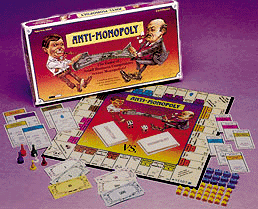|
|
 |
|
Broadband
Or Neckband? Some would use the perversion of the concept of Nature in the term `natural monopoly', surely an oxymoron when we know that large Telcos use their weight in a most unnatural way to limit broadband freedom of choice. Phone companies are trying to stifle Internet access competition. Even though the NZ Government has instituted and completed an enquiry into telecommunications in NZ, even though the morsal thrown to the masses called the the Kiwi Share is still there, three companies are doing everything in their power to drive out rivals and then divide up the telecommunications business amoungst themselves. The companies are Telecom NZ with its US backers, Telstra with its Australian backers and British Telecom with its UK backers. Note, none of these companies is in the slightest interested in anything about NZ except what profits it can repatriate back to the motherland. Its a no-holds-barred battle for control of the nervous system of New Zealand and the local companies need mass support if they are to hold out and keep in New Zealand income and control of telecommunications and the industry it underpins. Have no illusions, under the names are foreign telcos. Under i4free and zfree is Clear which in turn is virtually a BT trojan horse. Under paradise and saturn is Telstra. Under xtra and jetstream is Telecom NZ, under PlaNet is a few Kiwis trying to keep things in NZ. Your call.. Phone and recently saturn/Telstra cable companies are trying to dictate what you do once you get online. They'll tell you what your service provider will be. If you sign n with Telecom, you must use xtra. If you deal with Telstra you will be pushed onto paradise, etc, no choice. Its perfectly understandable that there is a strong demand for superfast Internet access. It opens up the Web to newer, richer content such as graphics and video. PlaNet, via pl.net and p-tv is already supplying streaming video, but really it will only be attractive to a mass audience when the stream becomes a river and the screen is full of 25 frames a second video and stereo audio out the sides - and it's always on, so you never have to worry about connecting or getting bumped. Consusmer broadband access is delivered through either: 1. Cable access, which uses the coaxial cable running into your home to deliver data or 2. DSL, which expands the capability of your existing phone line PlaNet will go with DSL (cable is the most expensive network-to-home there is). We'll do it when Telecom gets real about its supply price to ISPs. Don't hold your breath, but there are `rumours' the pricing to ISPs is about to reflect the market realities. DSL has been a failure for Telecom due to its policy of making start-up users pay for the start-up costs. Now radio (jargon for microwave) links are competing against DSL, the pressure is on for Telecom to compete. Getting fast access can be harder than finishing an Iron Man and a lot more expensive. In the US, where figures are made available, only 4.5% of more than 50 million ISP customers in the U.S. have either cable or DSL connections. Only one-quarter of the U.S. is wired for high-speed access. With installation crews stretched to the limit, getting a broadband hookup can take weeks or months. No one knows the situation in NZ, but its certain the percentages are lower and the prices higher. Expect the ISP wars to get hotter and the Governement to be the prime target for pro-monopoly pressure to force home Internet users to pay per minute while online, to have an `Internet Tax' and to have prices fall only while smaller and local ISPs are still in the industry. Open and locally owned Internet access is worth fighting for. Closed markets for fast access will result in: * Higher prices for Internet access (for lower-quality service) * Stifled freedom of expression with an exclusive gatekeeper determining Internet access contro l * Limited ability for civic and community groups to share information This isn't an article designed to get your attention and leave you gutted. You can act, you can make a difference. 1.Stay informed with www.pl.net and this ongoing campaign to democratise the communications industry. 2.Write/fax your MP. It sounds cliche, but the best way to get the attention of politicians is to hit them in the electorate 3. Write/fax the Ministry of Commerce and Communications (Paul Swain). Fax 04 4958466 or Post to Minister of Commerce, Paul Swain, Government House, Wellington (no stamp required). 4. Talk to others, network, that's what its all about.. |

